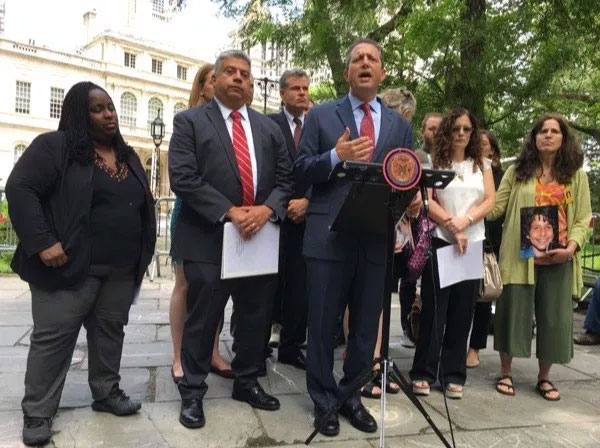Brad Lander Bill Would Empower City to Rein In Repeat Traffic Camera Violators
The “Reckless Driver Accountability Act” aims to flag drivers who are routinely ticketed by traffic enforcement cameras before they cause irreversible harm.

Street safety advocates, traffic violence victims, and Brooklyn District Attorney Eric Gonzalez joined City Council Member Brad Lander outside City Hall today to announce legislation that would allow NYC to rein in drivers who are routinely ticketed by traffic enforcement cameras, with the goal of preventing crashes like the one that recently killed two children in Lander’s district.
Cameras deter speeding: 81 percent of speeders ticketed by cameras do not get caught again. But there are still many motorists like Dorothy Bruns, whose car had been tagged several times for speeding in school zones and running reds before she hit Joshua Lew, Abigail Blumenstein, the children’s mothers, and a fifth victim in a Park Slope crosswalk in March.
The penalty for a traffic camera ticket is limited to a $50 fine. No license or insurance points are attached, and penalties do not escalate for repeat offenses. Under the current system, motorists like Bruns can avoid attention from law enforcement no matter how many camera violations she racks up.
According to Lander, though most drivers won’t receive a camera ticket in an average year, and 99 percent get fewer than five camera summonses, 1 percent of motorists — equating to about 26,000 cars — were issued five or more speed camera or red light camera citations over the past year.
“Drivers out there, thousands of them, put the lives of their neighbors at risk, with impunity,” said Lander.
The “Reckless Driver Accountability Act” aims to flag habitual offenders before they cause irreversible harm. One bill would empower the city to boot or impound vehicles after five or more speeding or red light camera violations within a 12-month period. Vehicles would be released if the owner proves he or she was not driving when the violations occurred, or if the owner completes a specialized traffic safety course.
A second bill would require the city to produce a yearly study on driving behaviors that cause the most harm, with recommendations for reducing such behaviors.
The third component of the legislative package would expand the Reckless Driver Accountability Program, a restorative justice project developed by the Center for Court Innovation and administered by the Red Hook Community Justice Center, in partnership with Gonzalez, Lander, Transportation Alternatives, and Families for Safe Streets.
According to Gonzalez, in its three-year history the driver accountability program has educated 500 participants in Brooklyn and Staten Island on the suffering and loss caused by reckless driving. Forty percent of motorists who complete the program avoid further traffic violations and arrests, Gonzalez said.
A $50 fine here and there “does not cause them to change their behavior,” said Gonzalez. “You have to make them think about what they’re doing.”
Motorists who are one ticket away from vehicle seizure would be offered the opportunity to complete the program. The idea, said attorney Steve Vaccaro, is to intervene before the fifth citation.
“The current system has no means of accountability for these offenses,” said Vaccaro, a traffic law expert who helped craft the bills.
Lander said his proposal has broad support among council members and other electeds, but it’s contingent on Albany renewing the city’s speed camera program, which will otherwise sunset this year.
Asked what happens if state lawmakers fail to re-up speed cameras, Lander replied: “Then they are putting the lives of their constituents and all New Yorkers in harm’s way.”





